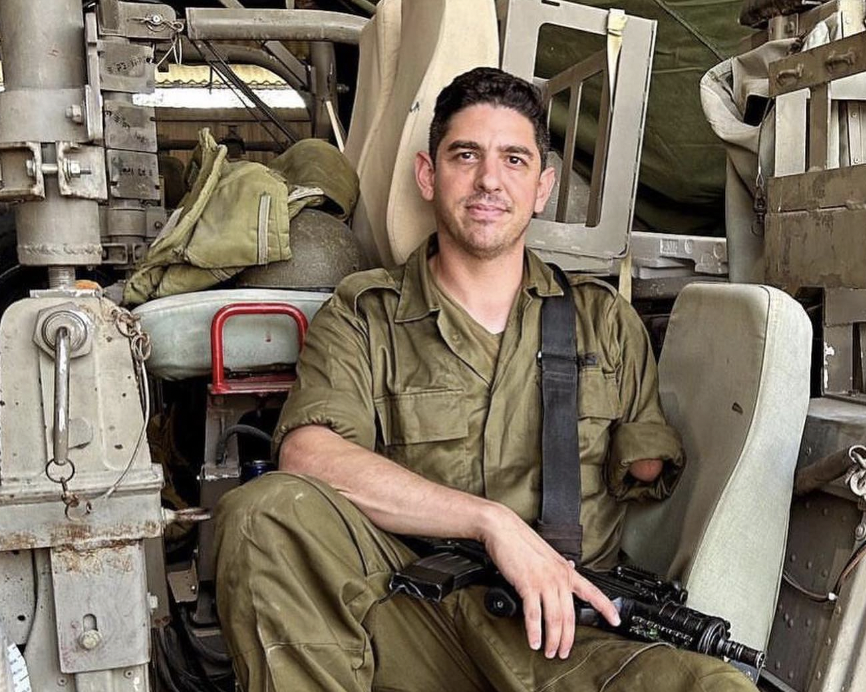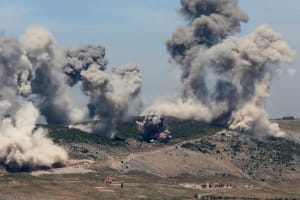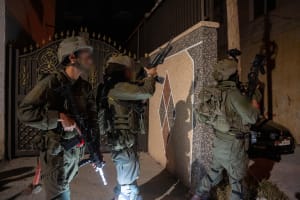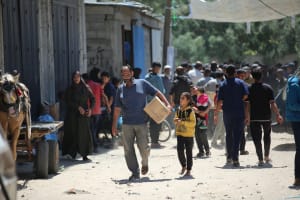Thousands of Americans voluntarily return to Israel to defend the Jewish homeland
'As a Jew, there is no better place to be than an IDF base,' says one returning Israeli soldier

Thousands of reservists and former soldiers of Israel Defense Forces living in the United States on Oct. 7, when Hamas broke through the southern border and slaughtered 1,200 Israeli citizens and abducted over 240 others into Gaza, left their peaceful lives in America and took up the cause to defend their Jewish homeland.
According to the Washington Post, around 10,000 U.S. residents have reported for IDF military duty since the war between Hamas and Israel began. A total of 360,000 Israeli troops with previous IDF experience have been called up for service.
The cause of defending one’s homeland against the threat of annihilation, however, comes with a high price, and often, varying opinions among family members about the conflict and Israel's response
For some, like Brooklyn-born Izzy Ezagui, the question of whether to fight alongside his countrymen was never up for debate.
Ezagui, who lost his left arm in 2009 during the 22-day offensive in Gaza called Operation Cast Lead, persisted in serving in the IDF after his injury, caused by a mortar that hit his base. He learned to cradle, fire and reload his rifle with one arm.

Three years ago, at the age of 35, his military service was complete, until that dark day - which Israelis now refer to as the 'Black Shabbat' of Oct. 7. Ezagui soon left his career in finance and made arrangements for his service dog, Punch, to stay with family before re-enlisting with the IDF.
“As a Jew, there is no better place to be than an IDF base,” he said. “There is no hopelessness here. I would be suffering if I stayed home.”
Soon after his arrival in Israel, he reunited with an officer he had known for years, who offered Ezagui an assignment transporting water and ammunition to units inside Gaza in addition to bringing the wounded back out. He described the nighttime missions as swift and chaotic – traveling foggy, narrow corridors where friendly-fire incidents could happen.
After returning home to Los Angeles on Nov. 7, to settle his affairs and find a permanent home for his dog, he volunteered to come back to Israel for 10 more years of reserve duty.
When he signed the forms asking for the reason he wanted to extend his service, Ezagui wrote two words: “Kibbutz Be'eri.”
Hamas terrorists massacred at least 130 people on Kibbutz Be'eri on Oct. 7, including women, children and infants, and burned down Israeli homes.
Ezagui knows there will be stressful and uncertain days in his future, but he is committed to helping Israel defend itself.
“Yes, people will die,” he said. “More Israelis will die. A lot of Palestinians will die. But what choice does Israel have?”
When Hamas terrorists and civilian accomplices rampaged through Kfar Aza on Oct. 7, a kibbutz two miles from the border with Gaza, targeting the west side of the community where families with young children lived – killing at least 52 people – Menachem Isseroff, a 29-year-old former Israel Defense Forces soldier from Brooklyn, also reported for military service.

Isseroff was sent to Kfar Aza where he described the carnage as “absolutely horrific.”
“Any one of those individual scenes would … last most people a lifetime.”
Back home in New York on Oct. 7, his younger sister Shterny was celebrating the Jewish holiday Simchat Torah, which ends the holiday of Sukkot. Upon learning what had happened, Shterny became concerned the Israeli government would use the massacre committed by Hamas as “justification” for carrying out “acts of violence against the Palestinian people.”
“War crimes, even,” she said.
Shterny Isseroff moved to Israel after high school, spending about five years there before leaving, partially because of her concern over the Israeli government’s treatment of Palestinians.
While in Israel, she opposed its occupation of Palestinian areas but at the same time was “disgusted to hear Palestinian friends celebrate after seeing footage of rockets hitting Israeli homes.”
“Very often, people are looking for a good guy and a bad guy,” she said. “If anything, I have learned that this is complex and there is a long history and a lot of pain.”
The two siblings agree that war is inherently bad, but Menachem sees it as Israel’s only alternative after the terrorist attack. Israelis, he said, are “damned if we do and damned if we don’t,” pushed between defending their homeland and contending with international criticism.
“The people of Gaza are not our enemies,” he said. “Hamas is our enemy.”
Shterny said she worries about her brother and how he might handle his military service years down the road. It was his choice to be in the IDF, she said, and “he’s going to have to live with the consequences of his decisions.”
Menachem said the two siblings care about each other deeply but that they see things differently.
There’s a “large amount of human suffering and death that is happening in Gaza right now,” but it was incited by the attacks Hamas launched, he explained. According to Menachem, the terrorist group is glossing that over as it “cynically highlights” the suffering aspect of the situation in the media that viewers like his sister subscribe to.
Menachem visited his wife and their two-year-old son, whom he left behind on Oct. 7, during a recent time of army leave. He was moved by his son asking him to sing “Shalom Aleichem,” a traditional song Jewish people sing at the start of Shabbat. The song is a prayer for peace upon Israel.
“That’s what you ask for,” Isseroff said. “Every week, that’s all you ask for.”
Menachem and Ezagui are among thousands of Americans who have served in the Israeli military.
Houston Mack, a 33-year-old, who lived in Israel for 10 years, obtained citizenship before returning to the United States over the summer. As the full picture of Hamas’ slaughter on Oct. 7 became clear, the IDF directed Mack’s unit of reservists to prepare for action.
The message was straightforward, Mack said: “Get your bags. Grab your kit and show up to base immediately. We’re at war.”
Mack, a Los Angeles native and IDF reservist, was living in Las Vegas at the time and was not obligated to return to Israel. However, after seeing video footage of Hamas’ brutality, he changed his mind.
During his Israeli military career, Mack had rotated through a variety of assignments throughout Judea and Samaria, internationally known as the West Bank.
In Tel Aviv, Mack noted, there are civilian-made 'shrines' to those who have been killed and taken hostage, some with teddy bears. He plans on staying as long as he is needed. His employer in the United States, a Marine Corps veteran, told Mack his job will be waiting for him when he returns.
When asked about the negative view some Americans have regarding Israel’s counterattack on the Hamas terror group in Gaza, Mack urged critics to recall the long history of antisemitism and atrocities committed against the Jews.
“There is no room for skepticism. There are still people to this day that deny the Holocaust,” he said. “We’re here to defend our right to exist in front of an enemy that wants to destroy us.”
A pause in the ground and air offensive is currently underway to allow for the release of hostages and the delivery of humanitarian aid and fuel to Gaza. According to the Gaza Health Ministry run by Hamas, thousands of children and other civilians have been killed, though the numbers cannot be independently verified and the organization includes terrorists and its accomplices in the list of civilian deaths.
The Israel-Hamas conflict has torn apart families and caused devastation on both sides.
At least eight U.S. citizens have been killed while serving in Israeli security forces since the war began, according to the U.S. State Department.
The willingness of U.S. citizens to take up arms for Israel is similar to the early days of Russia’s full-scale invasion of Ukraine, whose government appealed to Americans and other foreign nationals to help resist the offensive.
But there are differences to the two conflicts, as well.
In the case of Israel’s war with Hamas, most Americans who have joined the effort have served previously in the Israel Defense Forces or have remained IDF reservists. Typically, about 1,200 Americans serve in the IDF at any given time, and many are either Israeli-American dual citizens or about to gain their Israeli citizenship, according to a study published last year by the peer-reviewed journal, Sociological Forum.
During interviews, IDF veterans and reservists with U.S. citizenship who have left behind their American lives described feeling galvanized by the surprise deadly attack on the southern border communities in Israel, even as the ferocity of Israel’s response draws scrutiny. Some have begun to wonder about the war’s outlook beyond the Israeli government’s stated goal of destroying Hamas.
“It’s really not clear to any of us how this is going to play out long-term,” Isseroff said, referring to other members of the 55th Paratroopers Brigade.
“…You hope that the people who are telling you what to do have a good grasp on the bigger picture.”
They are trusting in the belief that good will come from their service and that a massacre like Oct. 7 will never happen again.

The All Israel News Staff is a team of journalists in Israel.













